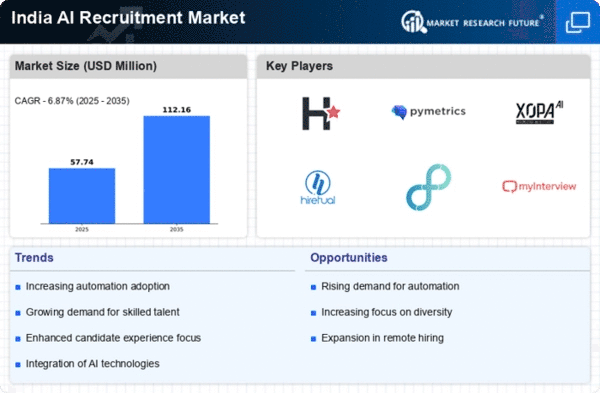Shift Towards Remote Work
The shift towards remote work has significantly impacted the AI recruitment market in India. As organizations adapt to flexible work arrangements, the geographical limitations in talent acquisition have diminished. Companies are now able to tap into a broader talent pool, allowing them to recruit candidates from various regions without the constraints of physical presence. This trend has led to an increase in the use of ai-driven recruitment tools that can efficiently screen and evaluate candidates remotely. Data indicates that remote job postings have increased by 40% in the last year, highlighting the growing acceptance of remote work. Consequently, the ai recruitment market is evolving to meet the demands of this new work paradigm, emphasizing the need for innovative solutions to attract and retain remote talent.
Focus on Diversity and Inclusion
The emphasis on diversity and inclusion is becoming a pivotal driver in the AI recruitment market in India. Organizations are increasingly recognizing the value of diverse teams in fostering innovation and improving business outcomes. As a result, there is a growing demand for ai recruitment solutions that can help eliminate biases in the hiring process. Companies are leveraging ai tools to analyze candidate data objectively, ensuring a fair evaluation of applicants from various backgrounds. This shift is not only beneficial for workplace culture but also aligns with the expectations of a diverse workforce. Recent studies suggest that diverse teams can enhance productivity by up to 35%, further underscoring the importance of inclusive hiring practices in the ai recruitment market.
Rising Demand for Skilled Talent
The AI recruitment market in India is experiencing a notable surge in demand for skilled talent across various sectors. As industries evolve, the need for specialized skills has intensified, prompting organizations to seek innovative recruitment solutions. This trend is particularly evident in technology, healthcare, and finance, where companies are increasingly leveraging ai-driven tools to identify and attract top talent. According to recent data, the skilled workforce in India is projected to grow by 30% over the next five years, further fueling the ai recruitment market. The ability to efficiently match candidates with the right skills to job openings is becoming paramount, as businesses strive to maintain a competitive edge in a rapidly changing landscape.
Integration of Advanced Technologies
The integration of advanced technologies into the recruitment process is a key driver of the AI recruitment market in India. Organizations are increasingly adopting ai and machine learning algorithms to streamline their hiring processes. These technologies enable recruiters to analyze vast amounts of data, identify patterns, and make informed decisions. For instance, the use of predictive analytics can enhance candidate selection, potentially reducing hiring time by up to 50%. Furthermore, the ai recruitment market is witnessing a rise in the adoption of chatbots and virtual assistants, which facilitate real-time communication with candidates. This technological shift not only improves efficiency but also enhances the overall candidate experience, making it a crucial factor in the industry's growth.
Regulatory Compliance and Data Privacy
Regulatory compliance and data privacy concerns are increasingly influencing the AI recruitment market in India. As organizations adopt ai-driven recruitment solutions, they must navigate a complex landscape of regulations governing data protection. Compliance with laws such as the Information Technology Act and the Personal Data Protection Bill is essential to ensure the ethical use of candidate data. Companies are investing in ai technologies that not only streamline recruitment processes but also prioritize data security and privacy. This focus on compliance is likely to shape the future of the ai recruitment market, as organizations seek to build trust with candidates while adhering to legal requirements. The ability to demonstrate robust data protection measures may become a competitive advantage in attracting top talent.
















